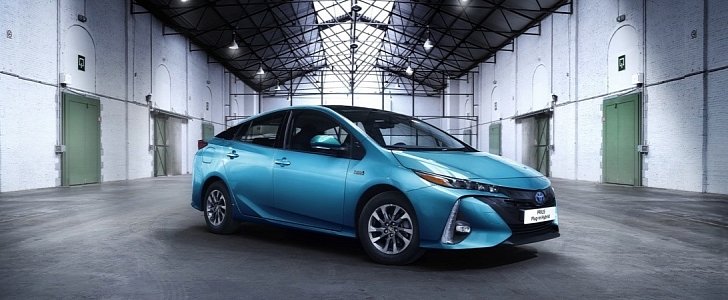Toyota has applied a strategy focused on hybrids for over a decade, with the Prius as the pioneer of the genre. Things might take a turn for electric power with its successor, as battery technology is evolving to a level well suited for this task.
The current Prius, which is in its fourth generation, is available in both full hybrid and plug-in hybrid versions. For zero-emission driving, Toyota offers the world’s first production hydrogen FCV, which is called Mirai.
While other automakers have offered hydrogen cars in the past, Toyota’s model is considered a world premiere because it is available on a global scale, while the early Hydrogen Fuel Cell cars from its competitors were limited to California or Japan, for instance.
When the Mirai was launched, Toyota’s officials stated that they do not want to focus on electric vehicles, choosing hybrid and hydrogen technology for its Eco-friendly offering. A few things have changed since then, and the changes come in the form of more electric cars available on the market.
While hydrogen fuel cell vehicles are currently the best option when it comes to Eco-friendly vehicles that can be refueled as fast as internal combustion automobiles, electric cars benefit from a significant advantage – infrastructure.
Even if the network of charging stations for electric vehicles is not as developed as the one for conventional vehicles, hydrogen fueling stations are rare when compared to electric charging points.
This difference might affect hydrogen cars in the future, because they might get discontinued in the long run if the infrastructure for them will not be as developed as the one for electric vehicles.
At the same time, battery technology is advancing at a rate that should bring consumers a comfortable level of range even in mainstream models.
While Tesla’s top-tier models do achieve sufficient levels of range for day-to-day travel and occasional road trips, volume automakers have not managed to match their numbers with more affordable models.
Toyota’s next Prius might fit the bill for this task, because the Japanese automaker could choose to follow Hyundai’s idea in the field, which was launched in the form of the Ioniq. The model we are referring is available with three powertrain options: plug-in hybrid, all-electric, and a "conventional" hybrid.
Toyota will probably keep the hydrogen fuel cell solution for the Mirai and its successor, while the next Prius could be available in an all-electric variant to suit this market segment. Thanks to this idea, Toyota will have a full EV in the range of top of the RAV4, which was discontinued.
A look on Toyota’s web page concerning the electric RAV4 states that the brand is already advancing the next generation of battery technology, so Evs are in plan for Toyota.
While other automakers have offered hydrogen cars in the past, Toyota’s model is considered a world premiere because it is available on a global scale, while the early Hydrogen Fuel Cell cars from its competitors were limited to California or Japan, for instance.
When the Mirai was launched, Toyota’s officials stated that they do not want to focus on electric vehicles, choosing hybrid and hydrogen technology for its Eco-friendly offering. A few things have changed since then, and the changes come in the form of more electric cars available on the market.
While hydrogen fuel cell vehicles are currently the best option when it comes to Eco-friendly vehicles that can be refueled as fast as internal combustion automobiles, electric cars benefit from a significant advantage – infrastructure.
Even if the network of charging stations for electric vehicles is not as developed as the one for conventional vehicles, hydrogen fueling stations are rare when compared to electric charging points.
This difference might affect hydrogen cars in the future, because they might get discontinued in the long run if the infrastructure for them will not be as developed as the one for electric vehicles.
At the same time, battery technology is advancing at a rate that should bring consumers a comfortable level of range even in mainstream models.
While Tesla’s top-tier models do achieve sufficient levels of range for day-to-day travel and occasional road trips, volume automakers have not managed to match their numbers with more affordable models.
Toyota’s next Prius might fit the bill for this task, because the Japanese automaker could choose to follow Hyundai’s idea in the field, which was launched in the form of the Ioniq. The model we are referring is available with three powertrain options: plug-in hybrid, all-electric, and a "conventional" hybrid.
Toyota will probably keep the hydrogen fuel cell solution for the Mirai and its successor, while the next Prius could be available in an all-electric variant to suit this market segment. Thanks to this idea, Toyota will have a full EV in the range of top of the RAV4, which was discontinued.
A look on Toyota’s web page concerning the electric RAV4 states that the brand is already advancing the next generation of battery technology, so Evs are in plan for Toyota.

